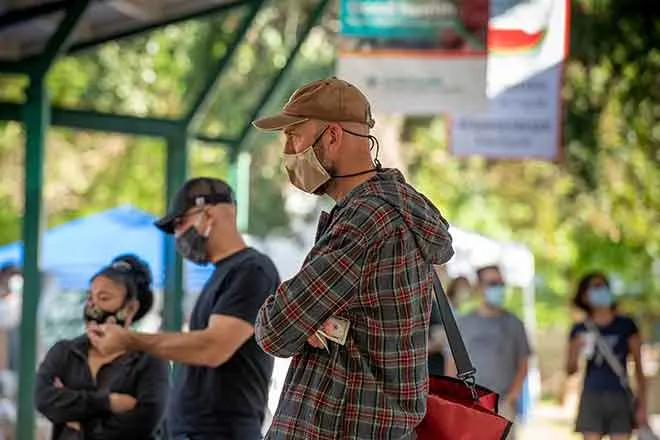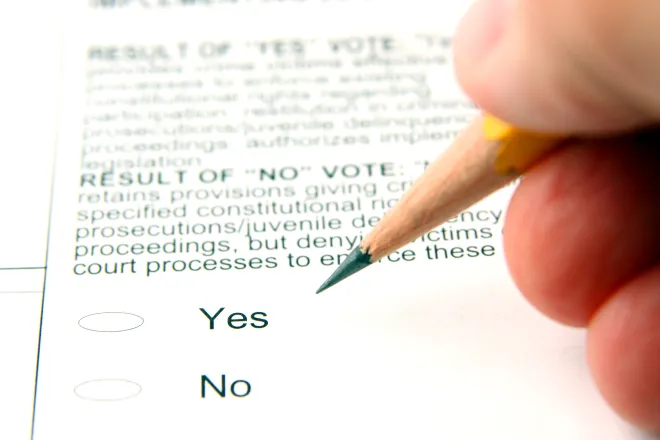
Daily Audio Newscast - May 23, 2024
News from around the nation.
Black voters in battleground states are a crucial voting bloc in 2024; Nikki Haley says she's voting for Trump in November; healthcare advocates suggest medical collaboration to treat fibroids; distinct vibes at IU Indianapolis pro-Palestinian protest.
TRANSCRIPT
♪♪
The Public News Service Dough Newscast, May the 23rd, 2024.
I'm Mike Clifford.
Black voters will play a key role in determining who will win the 2024 presidential election.
And while black voters remain overwhelmingly Democratic and support President Biden over former President Trump, Biden's edge over Trump is changing.
A new poll shows Trump ahead of Biden in five crucial battleground states, one being Nevada, over discontent about the economy and the war in Gaza, especially among young voters of color.
Rashawn Ray with the Brookings Institution says contrary to a popular misconception, black voters are not a monolith and do turn out to vote, with 2024 being no exception.
Oftentimes, they are choosing between the lesser of two evils because we have an overly simplistic two-party system.
And then the other part of this, there are some people who would rather stay at home than vote for someone who they don't think aligns with their particular politics and their cultural values.
Ray says the narrative that black people don't vote is simply not true.
Eligible black voters stand out for higher turnout rates than their Latino and Asian counterparts, according to Pew Research Center.
I'm Alex Gonzalez reporting.
It should be pointed out that black voters hold a range of ideologies, including conservative views that account for about 10 percent of black voters consistently voting for Republican candidates.
Next to "The Washington Post," former U.N. Ambassador Nikki Haley, who suspended her run for the Republican nomination for president in early March, announced she will vote for Donald Trump, but reiterated that he should not assume that her supporters will back him.
Quoting Haley, "I will be voting for Trump.
Having said that, I stand by what I said in my suspension speech.
Trump will be smart to reach out to the millions of people who voted for me and continue to support me and not assume they're just going to be with him.
I generally hope he does."
And this is Women's Health Month, and more than 26 million women in the U.S. have fibroids.
Fibroids are benign growths typically in the uterus and reproductive organs, and fewer than half of the people diagnosed have even heard of them.
In Missouri, state law since 2009 permits the Health Department to disseminate information about fibroids and treatment options.
Dr. Jan Katznelson, founder of the nonprofit Fibroid Fighters, says fibroids should not limit anyone living life to its fullest potential.
He adds, although many women can be symptom-free, about half will experience fibroid-related health concerns.
It's typically presented with a prolonged and heavy menstrual period, frequent urination, bloating, enduring intercourse, and very often with miscarriages.
It's extremely common.
Fibroids are easily diagnosed with an ultrasound.
Bara Siddiqui reporting.
Even Congress has taken up the issue of fibroids with legislation in the House last year that would have boosted fibroid research and education.
It had more than 80 sponsors, but the bill did not advance.
This is Public News Service.
And vibes from an IU-Indianapolis pro-Palestinian encampment feel different than protests at other Indiana universities.
More on this Mirror Indy, Free Press Indiana, Indiana News Service collaboration.
The difference is attributed to the diverse student body at IU-Indianapolis, which includes many working-class and older students.
These students, while passionate, may avoid escalating protests due to potential retribution.
The university's measured response contrasts with the crackdown on the Bloomington campus.
IU-McKinney School of Law student Michael Lynch believes administrators are weary of provoking more controversy.
Unlike many of the other encampments around the country, and I think the main reason for that is because of the media hullabaloo from IU-Bloomington.
And since we know that IU President Pam Witten likes to hide out, we think she's trying to keep things quiet.
Some Jewish community members on campus feel isolated and frustrated by the lack of open dialogue.
Despite differing views, the IU-Indianapolis encampment remains peaceful.
I'm Joe Illari reporting.
And new research shows that younger New Yorkers have different ideas about civic engagement.
A Philanthropy for Active Civic Engagement, or PACE, survey finds Gen Z was less positive or increasingly neutral in almost three-quarters of terms.
Terms ranking highest with Gen Z include freedom, unity, and community.
Amy McIsaac with PACE says a key takeaway is that the most positive terms for Gen Z centered around racial equity.
So, there is clearly a different relationship that Gen Z has to the words, and I would argue, the concepts behind these racial equity terms than, you know, these more traditional democracy terms and even, in many ways, the, like, community engagement service terms.
Some surveys show younger people are less likely to vote in the upcoming election than in 2020, a year with record-setting youth voter turnout.
I'm Edwin J. Vieira.
Finally, Mark Moran lets us know that climate-change experts warn that a warming planet threatens global food supplies.
He reports some famous chefs, including one in Minnesota, trying to educate more people while serving them luxurious menu items.
Andrew Zimmern and fellow culinary standout Sam Kass have been hosting occasional dinners, and a recent one in Minneapolis featured dishes crafted from what experts believe to be near-extinct ingredients.
The duo warns that if there isn't enough progress in reversing the effects of climate change, beloved staples such as chocolate and coffee will be out of reach for many people.
Margaret Klein-Salomon of the Climate Emergency Fund says this approach can be helpful with a major caveat.
If they're using those dinners to tell the truth about the climate emergency and the fact that everyone in the world is threatened by this.
Eating less meat were other suggestions.
This is Mike Clifford for Public News Service, member and listener supported.
Hear us on interesting radio stations, your favorite podcast platform.
Find our trust indicators at publicnewsservice.org.















